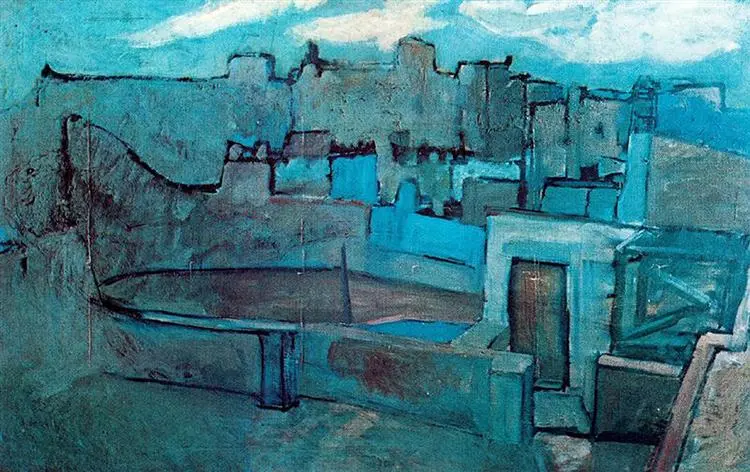Anyone who has ever gone furniture-shopping knows how even the most familiar of objects can be made new simply by being out of place. If the first effect is one of estrangement, the second is one of elucidation. Indeed, dozens of king-size beds scattered across an open showroom, detached from walls, unaccompanied by nightstands, strike the eye not only because they are unusual, but also because they redefine, momentarily, what it means to be a king-size bed. Suddenly, under the clinical lights of the furniture store, the bed’s defining characteristic is no longer its frame, comfort, or dimensions. Suddenly, its defining characteristic is this: that it is never in the same room as another king-size bed.
Re-reading the stories, essays and poems of the March issue, I was struck by how attuned they all felt, in their own ways, to the question at hand: What are those places in life where objects, people, ideas or identities are, however fleetingly, imbued with new understandings? The answers these pieces contain are as varied as they are vivid. A sento outside of Hiroshima, in Olivia Cheng’s short story Bathhouse Gossip, is where a Chinese man re-encounters his past life as a political science student in Beijing. The shifting assortment of her English, Arabic, and French accents is where, in her essay Joli Petit Accent, Jennie Abboushi teases through the richness and challenges of her plural identities. A Trinidadian taxicab, in Eskor David Johnson’s short story Taximen, is where the driver comes slowly to consider his prudence merely as veiled indecision. The paintings and texts of British-Ghanaian artist Lynette Yiadom-Boakye are where, in his essay The Art of Vagueness, Som Adedayor envisages a Black being-ness free from political preconceptions. And finally, everyday settings are where, in Andrea Cote’s poems Snapshot in the Kitchen, Your Name, and Animal, the speaker’s homeland’s contours—its conflicts, its men and even its trains—are redrawn, while a rainforest is where, in Rosa Castellano’s poem In Costa Rica, My Father Speaks, the speaker’s fractured journey through memory first takes root.
Across their vast geographic diversity, these pieces gesture towards a borderless question: can we encounter flashes of understanding in places besides our personal and collective histories’ most familiar nodes? In other words, can we find the things we have lost not in the places, physical and discursive, where we originally lost them, but somewhere else entirely? The March issue provides, if not an attempt to answer this question, then a look into what it means to experience one’s surroundings through its lens, to find oneself stumbling repeatedly into the furniture stores of the world, wondering: what is a king-size bed? Or, more apropos: what is a home country, a hustler, a self-betrayal, a Black being-ness, a mother tongue, a memory?
We are honored to be sharing the brilliant stories, essays, and poems that navigate these questions with our readers today. Welcome to Guernica’s March 2025 Issue!
–Youmna M. Chamieh, Editor-in-chief
—
“Taximen”–
In “Taximen,” set in Trinidad amidst economic hardship and social unrest, a group of taxi drivers navigate changing times, adapting to challenges and pursuing opportunities, with one driver’s journey highlighting resilience and transformation.
—
“Bathhouse Gossip” –
In “Bathhouse Gossip,” two old friends reunite unexpectedly in a Japanese bathhouse and reminisce about their shared past in China, reflecting on their differing views of the country’s political evolution, as well as their own changes.
—
“Joli Petit Accent” –
In her essay “Joli Petit Accent,” Jenine Abboushi reflects on her refusal to hide or disown any one part of her multicultural, Palestinian-American self – thereby embodying a hybridized way of being in the world that accurately reflects its plurality.
—
“The Art of Vagueness” –
In his essay “The Art of Vagueness,” Som Adedayor looks at the work of visual artist Lynette Yiadom-Boakye, and the opacity of her paintings, which do away with labels and fixed categories. The artist, he contends, circumvents political or racialized readings of the Black figures she paints, emphasizing only that they are human.
—
“Snapshot in the Kitchen,” “Your Name,” and “Animal” –
Three poems by Andrea Cote Botero, charting the embattlements, longings, and alienations of being between two places. Translated from the Spanish by Craig Epplin.
—
“In Costa Rica My Father Speaks” –
A poem by Rosa Castellano, weaving together images of nature and domesticity, innocence and violence, and generational love, into an “unstructured whirl through memory”.

